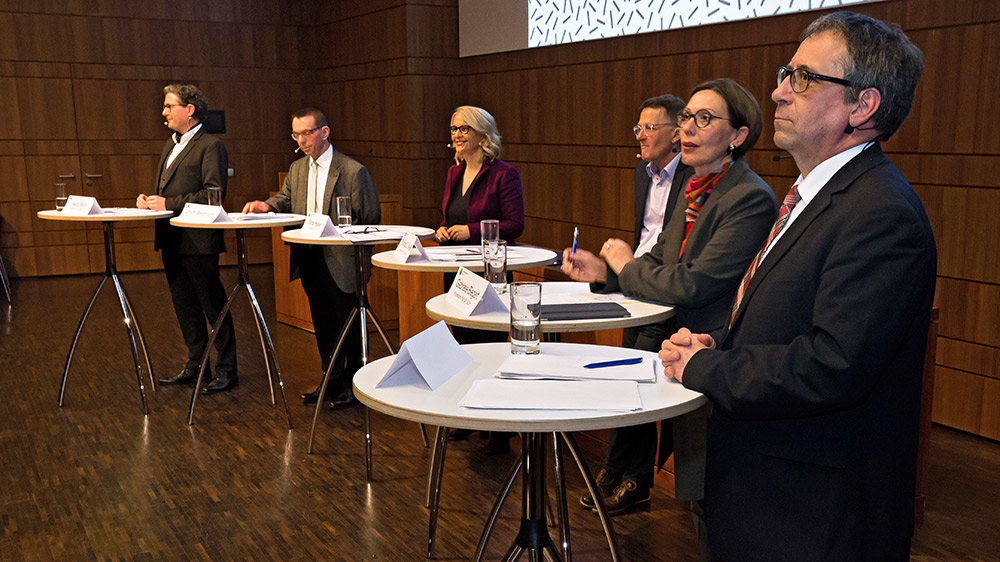Change Attitudes Not Rules

Switzerland aims to half its greenhouse gas emissions by 2030. In doing so, it would meet the aims of the Paris climate agreement. But what contribution can higher education institutions make to this target? This was the question tackled by a panel last week, staged as part of the Zurich Sustainability Week.
On the stage at the Zurich University of Teacher Education were: Jean-Marc Piveteau (President of Zurich University of Applied Sciences, ZHAW), Gabriele Siegert (Vice President of the University of Zurich), Thomas D. Meier (President of Zurich University of the Arts, ZHdK), Heinz Rhyn (President of Zurich University of Teacher Education, PHZH) and Ulrich Weidmann (VP of Human Resources and Infrastructure at ETH Zurich). The event was chaired by radio journalist Sonja Hasler (SRF Persönlich).
A question of attitude
All the participants on the panel thought the efforts of their institutions in the area of sustainability were basically satisfactory, but did acknowledge that there was some room for improvement.
They pointed out that sustainability in higher education institutions has already seen some positive developments: For example, UZH rents property in buildings that meet the Minergie standard and produces increasing amounts of solar power, while PHZH has moved into a modern new building and recommends that its employees only use flights for business trips if the distance is more than 600 kilometers.
In general, flights taken by employees are one of the biggest causes of carbon dioxide emissions. The universities are dependent on their employees choosing the more environmentally friendly option for their business trips, pointed out Jean-Marc Piveteau, President of ZHAW. However, he was against the idea of bringing in further rules and regulations for staff and students: “We have to change people’s attitudes rather than introducing more rules.” For Piveteau, sustainable thinking and behavior were a question of mindset and couldn’t be forced.
Everyone on stage was in favor of the need for universities to publish an accountability report about the sustainability of their activities. Currently, ETH is the only one to publish such a sustainability report. According to Ulrich Weidmann, VP of Human Resources and Infrastructure at ETH, the report is a significant tool for guiding the sustainability strategy and also demonstrates the importance that the university places on sustainability.
Lecture on sustainability
Some students expressed the conviction that sustainability should be more integrated into teaching at the universities. However, the panelists deemed an introductory lecture on sustainability to be unnecessary, saying that such topics were already included in specific courses at the different institutions. For example, designers worked together with material scientists, trainee teachers had to tackle sustainability topics in the new curriculum Lehrplan 21, and “green” subjects were also taught in the area of life sciences. At UZH, without the university having issued specific instructions in this regard, research centers had formed looking at issues such as sustainable finance, among others, noted Siegert. She doubted, however, whether it would be useful to give a lecture on sustainability to music students, for example.
Combined effort
In the subsequent Q&A session, the panelists addressed the critical questions coming from the audience. In particular, the core role of the universities was discussed, and the question of how far they should go in guiding their students towards sustainable behavior. In the end, a consensus was reached: Universities do have a role model function in regard to sustainability, but should avoid being too prescriptive through regulation. Rather, they should work together with students to find the way to create a more environmentally friendly university environment. Events such as the Sustainability Week, which was the initiative of over 100 students, were steps in the right direction.